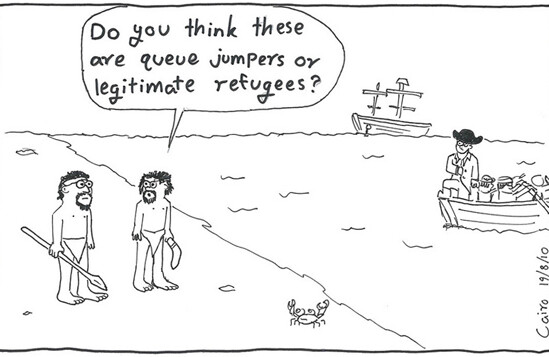Asylum seekers who come to Australia by boat have been accused of "jumping the queue" ahead of others in the immigration process. But are they trying to gain an unfair advantage, as both opposition leader Tony Abbott and the Labor government have suggested? Many Australians think so: According to a poll in the Sydney Morning Herald, 70 percent think that the Australian Government's new policy of (indefinitely) detaining asylum seekers in tents on Nauru is "proper." While it is admirable of so many Australians to display concern over the fairness with which the claims of different asylum seekers are processed, they need to take a closer look at the evidence.
First of all, there is no "queue" for boat people to jump. A queue is a process where, by mutual consent, a good is distributed in an orderly way on a time-spent basis. Refugee camps don't operate that way. They are not orderly processing centers where refugees arrive, take a number, and wait their turn. Resettlement is not allotted on a time-spent basis, and there is no guarantee that a refugee will be resettled at all—fewer than 1 percent of the world's more than 10 million eligible refugees were resettled by any country last year. Refugee camps are not the "regular" or "normal channels" for asylum seekers that the Labor government's new "No Advantage" policy says they are.
Permanent refugee camps are not, technically, supposed to exist.
In fact, far from being normal or regular channels, permanent refugee camps are not, technically, supposed to exist. The 1951 Refugee Convention mandates that signatory states grant travel and work rights to those they recognize as refugees. Confining them to camps fails to respect those rights, meaning that if host states fully complied with the Convention, these camps would not exist.
When it comes to refugee camps there is no mutual consent, and no orderly distribution on a time-spent basis. The more than 10 million refugees around the world hoping for resettlement right now did not go to countries like Pakistan or Syria to queue up—they went there because they sought refuge and had nowhere else to go. And time-spent did not determine which of them were among the less than 1 percent lucky enough to be resettled last year. So there is no queue to jump for asylum seekers who come to Australia by boat.
Some will object that, even if there is no queue, there is still a cap on the number of refugees granted visas to enter Australia, both onshore and offshore, in a given year. (The number has been at 13,750 for some years now, though it will go up to 20,000 under the new Pacific solution.) Consequently, when a person arriving by boat is granted asylum in Australia, this means that one less person from a refugee camp can gain asylum here.
Does this mean that people arriving by boat are wronging other needy people, even if they are not, strictly speaking, jumping a queue? It does not. It is not because "there are no seats left in the house" that a boat refugee displaces a camp refugee. Refugee visas were less than one-tenth of all permanent visas granted by Australia last year. So there are plenty of seats in the house, but the government has decided, by imposing this cap, that it does not want refugees to sit in them.
Refugee visas were less than one-tenth of all permanent visas granted by Australia last year.
Moreover, we generally accept that it is permissible to try to avoid harm, even if this means that someone else may instead be harmed. For example, if a bullet is heading my way I cannot use you as a human shield, or trick you into standing in front of me. But I am allowed to dive out of its path, even if you are behind me.
Those seeking asylum in Australia are trying to get out of the way of events that will seriously harm them if they remain where they are. They are also trying to avoid the harm of languishing indefinitely in a refugee camp. Indeed there are moral limits to what they may do to avoid these harms. For example, it would be wrong for the boat people to trick other refugees, or to use them as a means of escape. But they are doing no such thing.
There are certainly good reasons for wanting to discourage people from arriving in Australia by boat, including the risks that such practices pose for the people involved. But it is important to recognize that they are exercising a right under the 1951 Refugee Convention to avoid harm by seeking asylum in Australia. They do not deserve to be imprisoned for years in detention centers because of it.
Christian Barry is director of the Centre for Moral, Social, and Political Theory at Australian National University. John Simon earned his Ph.D. in philosophy from New York University and is currently a research fellow in philosophy at Australian National University.





